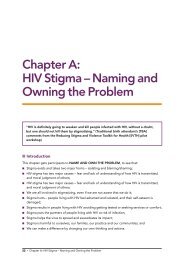Guide for Community Assessments on Women's Health Care - ICRW
Guide for Community Assessments on Women's Health Care - ICRW
Guide for Community Assessments on Women's Health Care - ICRW
You also want an ePaper? Increase the reach of your titles
YUMPU automatically turns print PDFs into web optimized ePapers that Google loves.
What Can a <str<strong>on</strong>g>Community</str<strong>on</strong>g> Do to Fight Gender-based Violence?<br />
●●<br />
●●<br />
●●<br />
●●<br />
●●<br />
●●<br />
●●<br />
●●<br />
●●<br />
Talk with family, friends and clients, and encourage community leaders to speak out against<br />
gender-based violence. Get people talking openly and make this problem visible.<br />
Help every<strong>on</strong>e–men, women and children–understand that gender-based violence is wr<strong>on</strong>g.<br />
Stand up and challenge others when they “blame and shame” women. Stop the stigma toward<br />
women and girls. Women should be respected.<br />
Reach out to abused women and support them. Once they feel accepted, they will be more<br />
open to discussing their situati<strong>on</strong> with others and getting help.<br />
Empower women and educate them <strong>on</strong> how to get support when abused.<br />
Form women’s groups and encourage women to support each other.<br />
Encourage women to report violence to police and get police to treat them seriously.<br />
Get police to en<str<strong>on</strong>g>for</str<strong>on</strong>g>ce existing laws <strong>on</strong> domestic violence.<br />
Address problems of excessive drinking.<br />
What Can <strong>Health</strong> <strong>Care</strong> Providers Do to Counsel<br />
Women Who Have Been Abused?<br />
●●<br />
●●<br />
●●<br />
●●<br />
●●<br />
●●<br />
●●<br />
●●<br />
●●<br />
●●<br />
Welcome the woman and make her feel com<str<strong>on</strong>g>for</str<strong>on</strong>g>table. Treat her with respect.<br />
Meet with the woman without her husband and help her decide what she wants to do. D<strong>on</strong>’t<br />
try to counsel the couple together and “negotiate violence.”<br />
Give her time to tell her story and express her feelings. Let her do the talking.<br />
Give her your full attenti<strong>on</strong> and listen attentively. Remember – a good counselor has big ears,<br />
big eyes, and a small mouth.<br />
Listen to and believe what she has to say. She needs a friendly, supportive ear, not a<br />
challenging or accusing resp<strong>on</strong>se. She needs help, not disbelief or hostility.<br />
Build <strong>on</strong> her strengths. Compliment her <strong>on</strong> what she has achieved so far, her coping strategies<br />
and survival skills such as coming to see you.<br />
D<strong>on</strong>’t questi<strong>on</strong> her behavior by asking questi<strong>on</strong>s such as “What did you do to make him so<br />
angry?” or suggest that her behavior provoked the violence. Focusing <strong>on</strong> her behavior will not<br />
solve the problem. The problem is with the man’s c<strong>on</strong>trolling behavior.<br />
Tell her that:<br />
you will treat her in<str<strong>on</strong>g>for</str<strong>on</strong>g>mati<strong>on</strong> in c<strong>on</strong>fidence, and you will not tell other people.<br />
she is brave to talk about her problem. It is sometimes difficult to talk about these things<br />
and sometimes it feels easier to stay silent and suffer.<br />
violence is wr<strong>on</strong>g. No <strong>on</strong>e has the right to beat another pers<strong>on</strong>.<br />
getting beaten is not her fault. She did not ask to be beaten.<br />
her feelings of love, anger, betrayal, hope, fear, sadness, guilt are all normal.<br />
After she has explained her situati<strong>on</strong>, get her to talk about what to do next. Be realistic and do<br />
not frighten her.<br />
Help her plan <str<strong>on</strong>g>for</str<strong>on</strong>g> her safety. D<strong>on</strong>’t tell her what to do. Help her c<strong>on</strong>sider her opti<strong>on</strong>s, but<br />
empower her to make her own decisi<strong>on</strong>s.<br />
100 Annex A: Fact Sheets

















